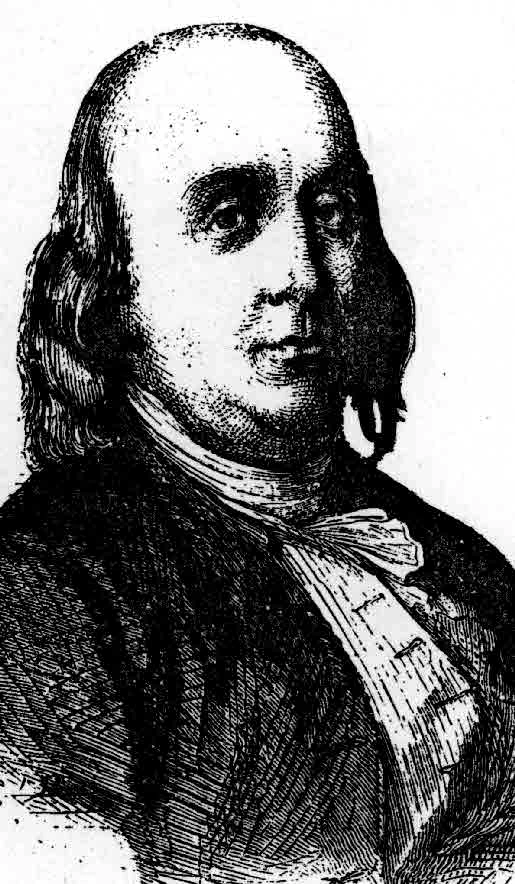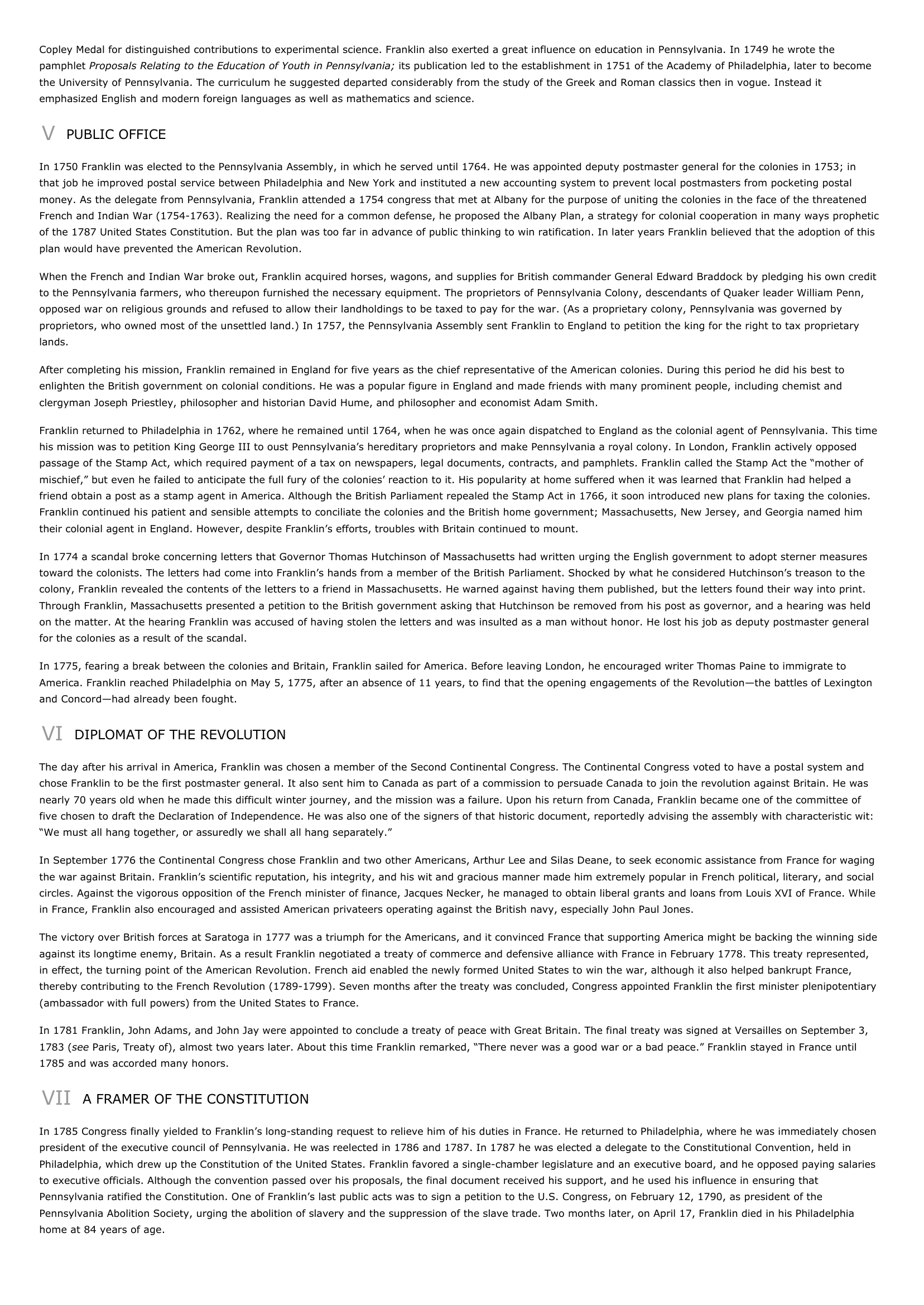Benjamin Franklin.
Publié le 10/05/2013

Extrait du document


«
Copley Medal for distinguished contributions to experimental science.
Franklin also exerted a great influence on education in Pennsylvania.
In 1749 he wrote thepamphlet Proposals Relating to the Education of Youth in Pennsylvania; its publication led to the establishment in 1751 of the Academy of Philadelphia, later to become the University of Pennsylvania.
The curriculum he suggested departed considerably from the study of the Greek and Roman classics then in vogue.
Instead itemphasized English and modern foreign languages as well as mathematics and science.
V PUBLIC OFFICE
In 1750 Franklin was elected to the Pennsylvania Assembly, in which he served until 1764.
He was appointed deputy postmaster general for the colonies in 1753; inthat job he improved postal service between Philadelphia and New York and instituted a new accounting system to prevent local postmasters from pocketing postalmoney.
As the delegate from Pennsylvania, Franklin attended a 1754 congress that met at Albany for the purpose of uniting the colonies in the face of the threatenedFrench and Indian War (1754-1763).
Realizing the need for a common defense, he proposed the Albany Plan, a strategy for colonial cooperation in many ways propheticof the 1787 United States Constitution.
But the plan was too far in advance of public thinking to win ratification.
In later years Franklin believed that the adoption of thisplan would have prevented the American Revolution.
When the French and Indian War broke out, Franklin acquired horses, wagons, and supplies for British commander General Edward Braddock by pledging his own creditto the Pennsylvania farmers, who thereupon furnished the necessary equipment.
The proprietors of Pennsylvania Colony, descendants of Quaker leader William Penn,opposed war on religious grounds and refused to allow their landholdings to be taxed to pay for the war.
(As a proprietary colony, Pennsylvania was governed byproprietors, who owned most of the unsettled land.) In 1757, the Pennsylvania Assembly sent Franklin to England to petition the king for the right to tax proprietarylands.
After completing his mission, Franklin remained in England for five years as the chief representative of the American colonies.
During this period he did his best toenlighten the British government on colonial conditions.
He was a popular figure in England and made friends with many prominent people, including chemist andclergyman Joseph Priestley, philosopher and historian David Hume, and philosopher and economist Adam Smith.
Franklin returned to Philadelphia in 1762, where he remained until 1764, when he was once again dispatched to England as the colonial agent of Pennsylvania.
This timehis mission was to petition King George III to oust Pennsylvania’s hereditary proprietors and make Pennsylvania a royal colony.
In London, Franklin actively opposedpassage of the Stamp Act, which required payment of a tax on newspapers, legal documents, contracts, and pamphlets.
Franklin called the Stamp Act the “mother ofmischief,” but even he failed to anticipate the full fury of the colonies’ reaction to it.
His popularity at home suffered when it was learned that Franklin had helped afriend obtain a post as a stamp agent in America.
Although the British Parliament repealed the Stamp Act in 1766, it soon introduced new plans for taxing the colonies.Franklin continued his patient and sensible attempts to conciliate the colonies and the British home government; Massachusetts, New Jersey, and Georgia named himtheir colonial agent in England.
However, despite Franklin’s efforts, troubles with Britain continued to mount.
In 1774 a scandal broke concerning letters that Governor Thomas Hutchinson of Massachusetts had written urging the English government to adopt sterner measurestoward the colonists.
The letters had come into Franklin’s hands from a member of the British Parliament.
Shocked by what he considered Hutchinson’s treason to thecolony, Franklin revealed the contents of the letters to a friend in Massachusetts.
He warned against having them published, but the letters found their way into print.Through Franklin, Massachusetts presented a petition to the British government asking that Hutchinson be removed from his post as governor, and a hearing was heldon the matter.
At the hearing Franklin was accused of having stolen the letters and was insulted as a man without honor.
He lost his job as deputy postmaster generalfor the colonies as a result of the scandal.
In 1775, fearing a break between the colonies and Britain, Franklin sailed for America.
Before leaving London, he encouraged writer Thomas Paine to immigrate toAmerica.
Franklin reached Philadelphia on May 5, 1775, after an absence of 11 years, to find that the opening engagements of the Revolution—the battles of Lexingtonand Concord—had already been fought.
VI DIPLOMAT OF THE REVOLUTION
The day after his arrival in America, Franklin was chosen a member of the Second Continental Congress.
The Continental Congress voted to have a postal system andchose Franklin to be the first postmaster general.
It also sent him to Canada as part of a commission to persuade Canada to join the revolution against Britain.
He wasnearly 70 years old when he made this difficult winter journey, and the mission was a failure.
Upon his return from Canada, Franklin became one of the committee offive chosen to draft the Declaration of Independence.
He was also one of the signers of that historic document, reportedly advising the assembly with characteristic wit:“We must all hang together, or assuredly we shall all hang separately.”
In September 1776 the Continental Congress chose Franklin and two other Americans, Arthur Lee and Silas Deane, to seek economic assistance from France for wagingthe war against Britain.
Franklin’s scientific reputation, his integrity, and his wit and gracious manner made him extremely popular in French political, literary, and socialcircles.
Against the vigorous opposition of the French minister of finance, Jacques Necker, he managed to obtain liberal grants and loans from Louis XVI of France.
Whilein France, Franklin also encouraged and assisted American privateers operating against the British navy, especially John Paul Jones.
The victory over British forces at Saratoga in 1777 was a triumph for the Americans, and it convinced France that supporting America might be backing the winning sideagainst its longtime enemy, Britain.
As a result Franklin negotiated a treaty of commerce and defensive alliance with France in February 1778.
This treaty represented,in effect, the turning point of the American Revolution.
French aid enabled the newly formed United States to win the war, although it also helped bankrupt France,thereby contributing to the French Revolution (1789-1799).
Seven months after the treaty was concluded, Congress appointed Franklin the first minister plenipotentiary(ambassador with full powers) from the United States to France.
In 1781 Franklin, John Adams, and John Jay were appointed to conclude a treaty of peace with Great Britain.
The final treaty was signed at Versailles on September 3,1783 ( see Paris, Treaty of), almost two years later.
About this time Franklin remarked, “There never was a good war or a bad peace.” Franklin stayed in France until 1785 and was accorded many honors.
VII A FRAMER OF THE CONSTITUTION
In 1785 Congress finally yielded to Franklin’s long-standing request to relieve him of his duties in France.
He returned to Philadelphia, where he was immediately chosenpresident of the executive council of Pennsylvania.
He was reelected in 1786 and 1787.
In 1787 he was elected a delegate to the Constitutional Convention, held inPhiladelphia, which drew up the Constitution of the United States.
Franklin favored a single-chamber legislature and an executive board, and he opposed paying salariesto executive officials.
Although the convention passed over his proposals, the final document received his support, and he used his influence in ensuring thatPennsylvania ratified the Constitution.
One of Franklin’s last public acts was to sign a petition to the U.S.
Congress, on February 12, 1790, as president of thePennsylvania Abolition Society, urging the abolition of slavery and the suppression of the slave trade.
Two months later, on April 17, Franklin died in his Philadelphiahome at 84 years of age..
»
↓↓↓ APERÇU DU DOCUMENT ↓↓↓
Liens utiles
- Mc. TEAGUE Benjamin Franklin (résumé)
- Benjamin Franklin par Esmond Wright Professeur d'Histoire américaine à l'Université de Londres Qu'il s'agisse de l'histoire de la République américaine, de la science américaine, du fédéralisme américain ou du journalisme américain, tout commence par Benjamin Franklin.
- Franklin Benjamin, 1706-1790, né à Boston (Massachusetts), homme politique et savant américain.
- Benjamin Franklin - Biography.
- Benjamin Franklin




